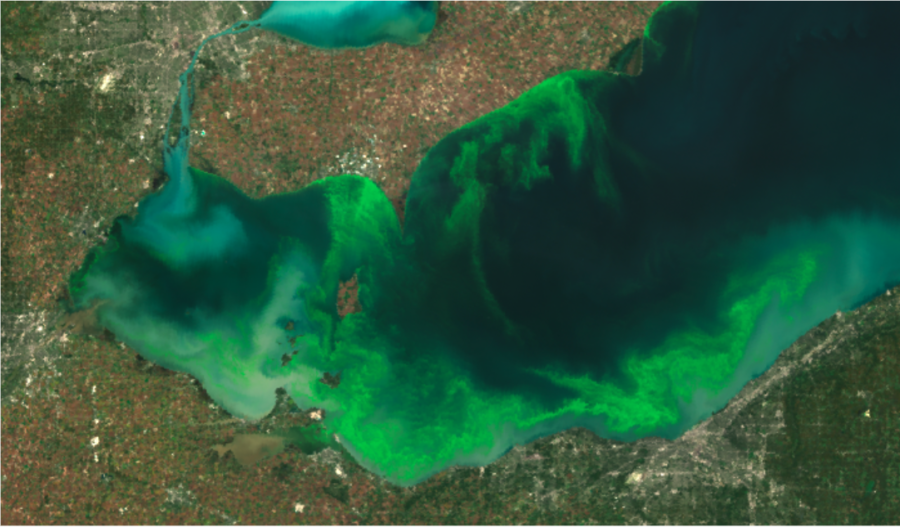From Good to Bad to Worse — Catastrophic Algae in The Great Lakes
The five Great Lakes on the border of Michigan and Canada are one of the world’s largest ecosystems and the second-largest fresh-water supply. These bodies of water are currently threatened due to more than two centuries of exposure to dangers caused by human activity. As the areas around the water became more populated, the lakes became more polluted from the cities themselves, as well as excess fertilizers. Farmers from nearby towns, further away, dump their fertilizers into waterways. The Great Lakes’ ecosystems became polluted with sewage, oil, and fertilizers from centuries of exposure to human activity.
It will be early October when David Meyerholtz gets into his 18-ton combine to harvest his 1,500 acres of corn and soybeans he and his dad plant every year. 150 years ago, this land was not crop-land; it was part of The Great Black Swamp, a wetland the size of Rhode Island. Once people began settling along this swamp’s shores and the contributing rivers, the water pollution levels spiraled downwards. After the completion of the Erie Canal, even more people migrated westward to Ohio. Great cities were built, and farms were established polluting major waterways making the water quality worse. The pollution got so bad in ports and tributaries that the water in Ohio’s Cuyahoga River caught fire multiple times, the biggest one on June 25, 1952. There was another one on June 22, 1959. This fire sparked the life in the many environmental causes to save the ecosystems. To feed the settlers, farmers built croplands right on top of the wetlands, filling in The Great Black Swamp with dirt, and pumping the water out. It took about 70 years to fill in the wetland with dirt to make the land ready for farming. By doing this, Americans destroyed the once thriving ecosystem. “We know we’ve lost 95 percent of our wetlands in this area,” says Amy Brennan, the Conservancy’s Lake Erie conservation director. “We’re not going to recreate the Great Black Swamp. No one’s deluding themselves about that.”
The lakes’ pollution got worse throughout this time as more and more fertilizer was poured into the lakes. This continued until 1972, when the government passed the Clean Water Act. This was one big step to saving the ecosystem.
Today, intense rains in the summer, spring and winter wash off the excess fertilizer from crops and fields causing great amounts of fertilizer runoff to travel into ditches, streams, and rivers, all of them leading into the Great Lakes. For many years up until now, it was hard to know how much fertilizer was enough, and because excess doesn’t hurt the crops, it seemed too risky to use too little. In 2011, because of fertilizer runoff and a warming climate, blue-green algae bloomed a record-breaking 1,920 square miles of Lake Erie’s surface. For three days, in the city of Toledo, the city officials were forced to shut down the water system due to toxins produced by the algae that was in their water source. This has been happening every year since then, getting progressively worse.
Trump’s budget cuts on the EPA are a new danger to the Great Lakes. Due to the Trump Administration, the EPA lost nearly a third of their money which could be used to help clean up the lakes’ waters. It will take more than 2 million dollars for people who want to protect and cure the Great Lakes to clean up the water, but after the budget cuts, these people will not have enough money to do everything they can. Because these pro-environmental agencies will lose a significant amount of money, their positive effects to save the lakes will diminish.
Nearly one fifth of the world’s’ freshwater supply and one of it’s biggest ecosystems is threatened by fertilizer runoff and the algae blooms. These are big problems that Americans caused and therefore, we should attempt to fix it. “ If we don’t make any changes, any steps to improving our ecosystems, the Great Lakes could be constantly clogged with toxic algae, billions of lives would be impacted in a negative way.” – interview by Shane McNabb

